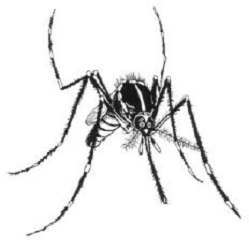Mosquitoes Swarm Cherokee County
You wouldn’t expect to open your weather app and read, “cloudy with a 100% chance of mosquitoes” but that appears to be the forecast for the next few weeks at least.
The past three months have seen an unusually high level of rain in Georgia. In some areas, rainfall is up more than 200% compared to 1981-2010 averages. (https://www.weather.gov/ffc/rainfall_scorecard)
The result of this heavy rain is a rise in mosquito populations which will plague the state and reduce the enjoyment of what little outside time quarantine allows for us.
The Relationship Between Rainfall and Mosquitoes:
To understand how mosquito populations are impacted by rainfall, it is first necessary to understand the mosquito life cycle.
Female mosquitoes lay thousands of eggs at once, but before laying these eggs they first require nutrients. To get those nutrients, female mosquitoes feed on the blood of a host (that would be you) and use that to sustain the eggs.
Mosquito larvae start their lives underwater, so female mosquitoes need a source of standing water in which to lay the eggs.
Even the smallest amount of standing water can serve this purpose, with puddles and birdbaths serving the function just as well as a large pond or lake.
The more sources of standing water available, the easier it is for mosquito populations to grow exponentially.
While there are other environmental factors that impact mosquito populations, such as temperature, access to standing water is the most critical.
How to combat the spread of mosquitoes around your home:
If you are trying to deal with mosquitoes around your property, here’s some advice from a guy who’s been in the pest industry for a few decades now.
Start with moisture control. Do what you can to get rid of any sources of standing water around your property. Remember that even the smallest standing water source is sufficient for mosquito reproduction, so you’ll want to use a fine-tooth comb.
A few common problem areas you should investigate include:
-Birdbaths
-hollow tree stumps
-Buckets, barrels, wheelbarrows, and anything else you might leave out in the yard
-Holes or divots in your yard that could collect water
-Drainage pipes or gutters that allow water to pool
Dealing with large bodies of water is a bit more challenging. For ponds, lakes, and other major water features, you’ll want to go the treatment route.
I recommend you call in professionals for this since the most powerful mosquito treatment products aren’t available to normal consumers. Additionally, mosquito treatment is a complex process, and you don’t want to miss a step or miscalculate how much treatment is needed.
Treatment products that prevent young mosquitoes from developing can be applied to bodies of standing water, and they are highly effective at reducing the expansion of mosquito populations.
What about dealing with the existing mosquito population?
While stopping the growth of new mosquitoes is good progress, you don’t want ANY mosquitoes around your home.
To achieve this, it’s once again time to call in the pros. Treatment to wipe out adult mosquito populations typically takes the form of an aerosol product sprayed from a vacuum. While completely safe for humans and pets, the aerosol is deadly for mosquitoes.
If treatment is reapplied regularly, you should see an almost complete elimination of mosquito activity around your home.
If you need mosquito treatment solutions, my team and I at Canton Termite and Pest Control are at your service. We’ll create a comprehensive treatment plan that identifies and eliminates problem areas around your property, decimating pest populations, and keeping your property usable year-round!
If you have additional questions or want to schedule a service, call us TODAY at 770-479-1598!
By: Tim

